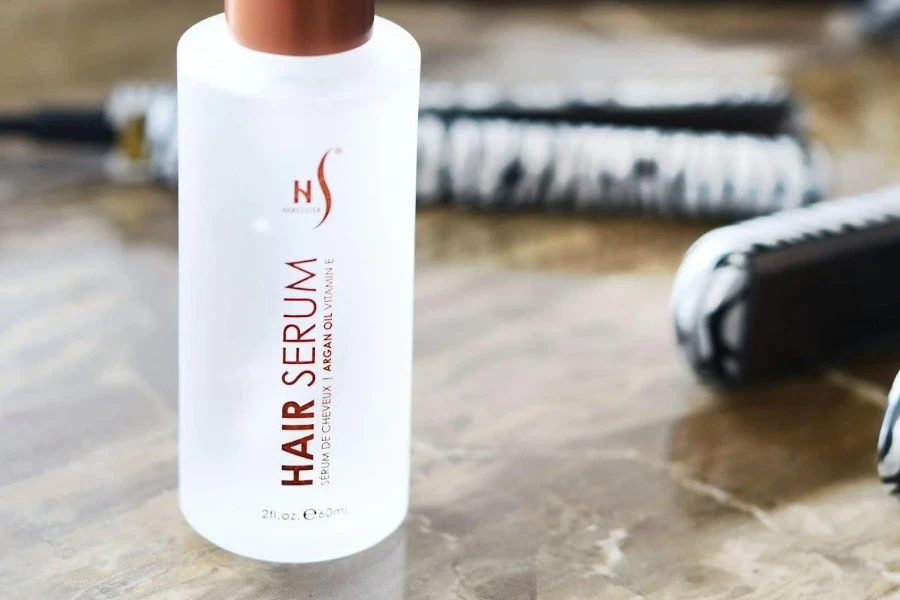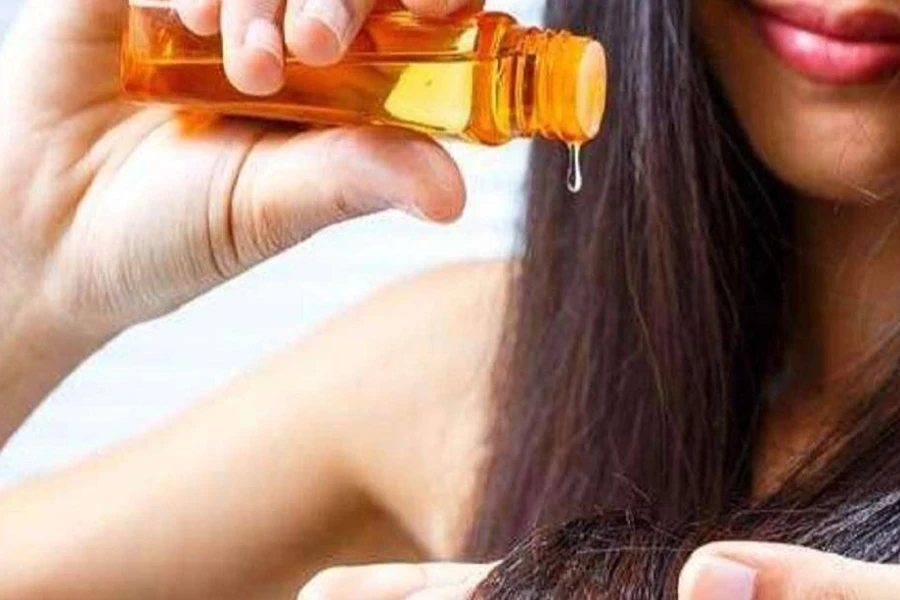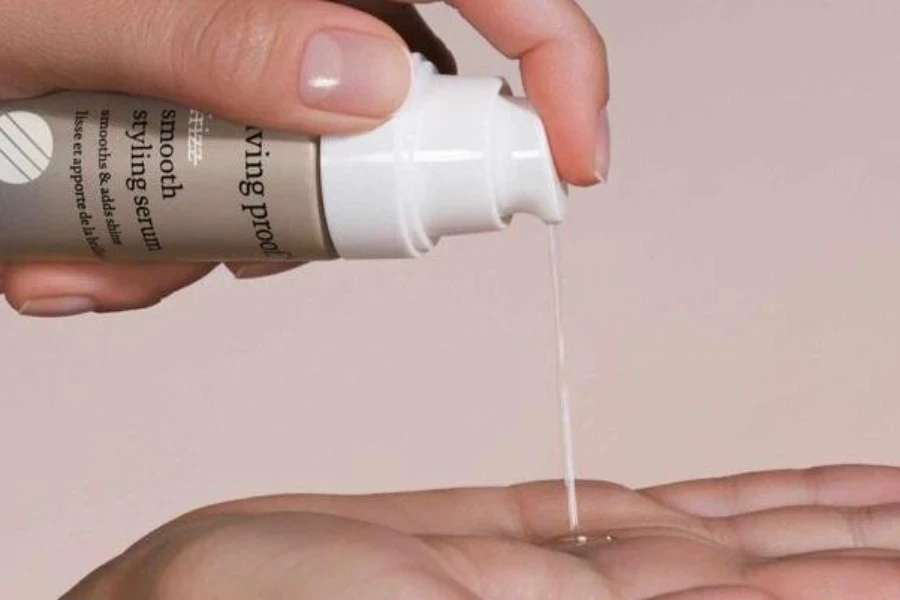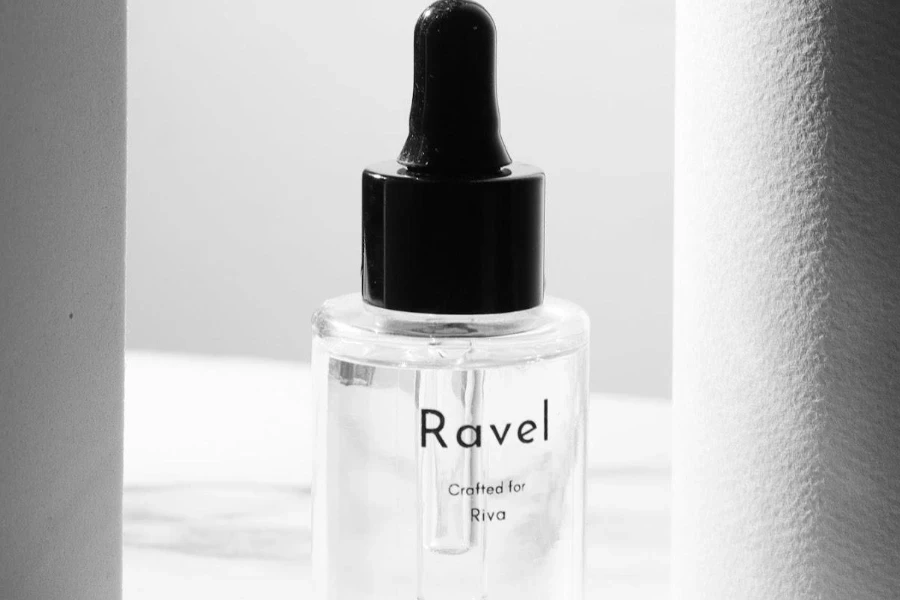Hair care can be tricky sometimes. Not every volumizing shampoo revives limp hair, and not every hair mask revitalizes curls. However, hair serums are underrated products consumers can add to their post-hair wash routine.
These products do many things for consumers with various hair concerns. However, it all boils down to choosing the right type for target customers. This article will highlight what sellers must remember when adding hair serums to their beauty inventories in 2024.
Table of Contents
What is the size of the hair serum market?
Why do consumers need hair serums?
3 factors to keep in mind when stocking up on hair serums
Bottom line
What is the size of the hair serum market?
The value of the global hair serum market reached US$ 1.34 billion in 2022. Experts say the market will cross US$ 2.20 billion by 2028, registering an impressive 8.62% compound annual growth rate (CAGR). The hair serum market is experiencing significant growth for several reasons.
First, with more consumers experiencing hair loss, there’s an increasing preference for herbal hair serums. Second, social media platforms are also positively influencing the sales of hair serums, especially to young adults, helping to boost market demand. In addition, e-commerce offers increased access to hair serums, and the increased disposable incomes help boost sales and demand.
Why do consumers need hair serums?

Hair serums are typically the go-to for softening and soothing hair layers. But that’s not all they do. These products also serve as lubricants when sterling, helping to prevent annoying cuticle damage. Are these not enough reasons consumers need these products? Don’t worry, there’s more.
Many consumers love hair serums for their reparative and protective properties. They can coat and protect the hair from heat damage while adding an amazing shine that makes hair look lustrous. Hair serums are also great for locking in moisture and preventing fizz. Here’s an aspect most people don’t know: hair serums also help nourish the scalp, stimulate blood circulation, and boost healthy hair growth.
Do all these benefits make hair serums desirable? Yes! And Google data can prove it. In February 2024 alone, up to 246,000 people searched for hair serums, a 10% increase from the consistent 201,000 monthly searches in 2023.
3 factors to keep in mind when stocking up on hair serums
Hair concern and type

Hair serums are wondrous products that can do almost anything hair-related. While some variants offer multiple solutions, most hair serums are more targeted in their approach. For this reason, there is a hair serum for every hair concern and type. Keep reading to explore the various hair concerns sellers can cater to:
Dry and dull hair
When hair lacks nourishment and hydration, it becomes dull and dry. Hence, such consumers use hair serums that flush out anything blocking hair follicles. These serums should also hydrate, nourish, and retain these effects on the hair to keep it smooth and lively.
Thin and frizzy hair
Thin and curly hair is another annoying hair concern for most consumers. It affects their appeal, especially when they don’t handle it with the right products and ingredients. So, these consumers often require serums (preferably organic) that help deal with thin fast while repairing and hydrating it gently to avoid frizz.
Curly hair
Consumers with curls must always make their hair look great—because things can quickly look and feel terrible with curly hair. Such consumers often prefer lightweight hair serums that help redefine their curls while promising to keep them hydrated. They steer clear of thicker serums—they’ll prevent them from rocking those perfect twirls.
Colored hair
Colored hair requires the most extensive aftercare to help restore life and nourishment to bleached hair. Since hydration is a big part of colored hair care, consumers will likely go for serums capable of providing the much-needed deep conditioning.
Serum type

Usually, serums come in three types: smoothing, hydrating, and repairing formulas. Each brings something different, meaning what works for one consumer will likely not work for the other. Here is a closer look at each type.
Smoothing serums
Consumers dealing with curly hair or constantly battling flyaways will find peace with smoothing serums. These serums create impressive barriers, helping to keep all that frizz subdued. The results? Consumers can now enjoy the polished finish they’ve been looking for.
Hydrating serums
Curly hair is one thing, but dry, brittle hair is like taking things to the next worst level. Luckily, hydrating serums offer the perfect solution! These hair serums are loaded with moisture-rich ingredients that won’t evaporate in contact with the hair. Instead, they will rejuvenate it, leaving the hair better and hydrated.
Repairing serums
Sometimes, it gets damaged when consumers style their hair with excessive heat or apply many chemicals. The results are mostly worse for wear. Thankfully, repairing serums is their hero. These are the serums for consumers to nourish and restore their damaged strands.
Ingredients

While different hair concerns and serum types exist, ingredients give these products the ability to offer perfect solutions. Some hair serums may contain ingredient cocktails, offering multiple benefits in one bottle. Here is a look at the best hair serum ingredients to ensure businesses provide the right ones to their target consumers.
Argan oil
Natural oils are popular for hair serums, but one that particularly stands out is Argan oil. Argan oil is one of the most common hair serum ingredients. It has a good reputation because of its amazing nourishing and moisturizing qualities, helping to hydrate the hair, combat frizz, boost hair texture, and protect it from heat.
Silicone
Silicon-based ingredients are another big hit for hair serums. They are the go-to for creating proactive barriers to reduce moisture loss. Silicone-based serums also provide polishes and a smooth appearance, helping to detangle hair and improve manageability.
Keratin
Since keratin already creates hair structure, hair serums containing it will excel at strengthening and repairing damaged ones. The results are usually smoother and healthier strands. Keratin-packed serums also offer some protection from environmental factors and heat damage.
Panthenol
Panthenol should be the top priority if consumers want to attract and retain moisture. This ingredient can also help boost hair elasticity, increasing its resistance to breakage. In addition, panthenol offers more shine and volume, making hair look healthier and fuller—however, the ingredient should be high on the list for the best results.
Bottom line
Hair serums are amazing. These products are incredible multi-taskers that can help solve various hair issues, from curly to dry and damaged. However, choosing the right options is essential to getting the best results.
Having lustrous hair isn’t always a smooth journey. But, retailers can make it easier for their buyers by offering the right type and ingredients for their hair concerns. This is also the best way to increase hair serum sales in 2024.




